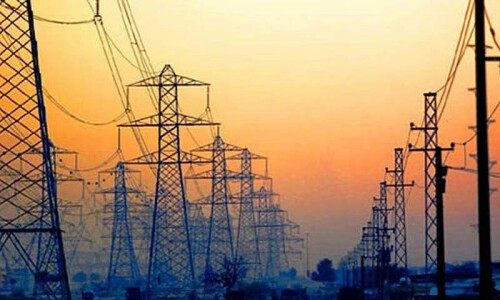IT would be an understatement to say that Pakistan finds itself between a rock and a hard place. It makes more sense to suggest that reality has at last caught up with us and that we are struggling to come to terms with it.
Never before in recent history — more so even than when Modi annexed occupied Kashmir — has the national morale been so low. Even so, we are not, it seems, ready to accept the fact that we are collectively responsible for our present economic plight.
The government may, in its own eyes, have scored brownie points by, in the larger cause, repairing the breach with the IMF. But — in view of the extortionate rise in fuel prices — its victory has, if anything, been pyrrhic, making a dent in its own credibility.
The PTI has inevitably made political capital out of the ruling coalition’s constraints, with the latter claiming that it was a case of force majeure and trying to pass the buck.
A time does come when one simply has to pay the piper.
Mutual recrimination is, however, not warranted where what we see today is clearly the end result of a cumulative process. Debt servicing has, for a variety of reasons, never been a top priority with us. But a time does come when one simply has to pay the piper. It is eminently possible that this is such a time.
Among the most pressing concerns of the government today, besides that of providing essential services to its citizens, is supposedly that of giving succour to those who, according to a glib federal cabinet minister, had “been left behind”. The initiative of the proposed handouts of Rs2,000 a month to about one-third of the people of the country — the paucity of funds notwithstanding — may, in the government’s own eyes, be commendable. But there are those who would hold that it is derisory.
If looked at more searchingly, however, the government’s tightrope walking speaks — the sage input of economic experts notwithstanding — of something more fundamental such as the grim wages of a free-market economy run amok.
The issues of food and energy security aside, the sheer human cost, across the lower social strata, of the benefits accruing to the advantaged few cannot be counted in terms of the cold calculus of economics. We are speaking of a vast segment of society that has all but been abandoned and is there as if on sufferance as it waits for a modicum of state support.
The picture is bleak. An overall widening of the tax net together with a withdrawal, as demanded by the IMF, of income tax exemptions from select salaried people will doubtless help, though only in the short term.
The time has come when we must look squarely at the facts. If we have — or have historically had — a deficit economy, it is because governments of the day have routinely been given to thinking and planning precisely in the short term and, as and when required, treating symptoms rather than causes.
Imran Khan’s view that a purge of those he thinks of as offenders at the top is the solution is, of course, a little simplistic. Though most of us may not like to be reminded of the fact, corruption is endemic in the country. It is a way of life. Without making value judgements, let us spare ourselves the discomfort and concede, however euphemistically, that ours is a kind of runaway plutocracy.
Let us be quite clear, though, on one point. Imran Khan and his PTI cohorts, who themselves signed up for the IMF programme, were, quite like the present government, simply trying to keep what we call, in awed whispers, the ‘system’ in place.
In light of this, the government of the day plainly needs to engage in some serious soul-searching. Questions as to the future of the societal whole that we think of as Pakistan need to be asked.
Something bigger — and more frightening — has also meanwhile overtaken us as a result of the divisions besetting us. If, as Khan argues, the present government lacks the moral authority required to continue to rule, he and his cohorts — herein lies our dilemma — manifestly lack the competence to replace it.
In any case, Khan’s nostrums seem to be too basic to be credible. Given an otherwise canny persona, it is hard to believe, however, that his call for jihad or freedom is anything but a cynical populist ploy.
He is surely aware that, except where there is rampant poverty as in present-day Afghanistan, there can be no such thing as an egalitarian society. Alternatively, good governance within the existing neoliberal terms of reference too will not suffice. A more hybrid order with a mixed economy akin to social democracy alone will do.
Paying lip service to austerity is not the answer. A more radical change in lifestyle at the upper echelons is called for. Despite what comes across as a nod and a wink and a void of values, the rich must clearly dream up a summum bonum of a new kind.
The writer is the founder chairman of Dialogue: Pakistan, a local think tank.
Published in Dawn, June 21st, 2022













































Dear visitor, the comments section is undergoing an overhaul and will return soon.